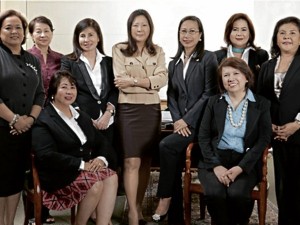
Members of the Women in Construction Foundation Inc. The Philippines still leads Asian countries in reducing inequality between men and women, according to the 2012 Global Gender Gap rankings of the World Economic Forum (WEF).
MANILA, Philippines—The Philippines still leads Asian countries in reducing inequality between men and women, according to the 2012 Global Gender Gap rankings of the World Economic Forum (WEF).
The report showed the Philippines remained among the top 10 with the least gender disparity. It had an overall score of 0.7757, to rank eighth out of 135 countries, unchanged from the previous year.
Nordic countries Iceland, Finland, Norway and Sweden led the world, having closed their gender gaps by over 80 percent. Other countries in the top 10 are Ireland (5th), New Zealand (6th), Denmark (7th), Nicaragua (9th) and Switzerland (10th).
Countries in the bottom 10 are Egypt (126th), Iran (127th), Mali (128th), Morocco (129th), Cote d’Ivoire (130th), Saudi Arabia (131st), Syria (132nd), Chad (133rd), Pakistan (134th) and Yemen (135th).
“The key for the future of any country and any institution is the capability to attract the best talents,” Klaus Schwab, WEF founder and chair, says in a statement.
“In the future, talent will be more important than capital or anything else. To develop the gender dimension is not just a question of equality; it is the entry card to succeed and prosper in an ever more competitive world,” he adds.
The annual survey ranks countries on their ability to close gender gap in four categories namely educational attainment, health and survival, economic participation and opportunity and political empowerment. The scores range between 1 (equality) and 0 (inequality).
The Philippines got the perfect score of 1 to rank first (tied with 19 countries) in educational attainment which captures the ratios of women to men in primary, secondary, and tertiary levels of education.
With a score of 0.9796, the Philippines also grabbed the top spot (tied with 31 countries) in health and survival which gives an overview of the differences between women’s and men’s health.
Further, the Philippines was among the top 20 in the two other categories with a score of 0.7719 (17th) in economic participation and opportunity and 0.3515 (14th) in political empowerment.
“The Philippines is the only country in Asia this year to have closed the gender gap in both education and health,” the report said adding it had the highest rank among Asian countries.
The country’s overall ranking bested Association of Southeast Asian Nations neighbors Singapore (55th), Thailand (65th), Vietnam (66th), Brunei Darussalam (75th), Indonesia (97th), Malaysia (100th) and Cambodia (103rd).
Meanwhile, global trends showed that the 135 countries covered in the report, representing over 90 percent of the world’s population, have closed almost 96 percent of the gender gap in health and nearly 93 percent of the gender gap in educational attainment.
However, the gap between women and men in economic participation and political empowerment remains wide. Only 60 percent of the gap in economic outcomes and 20 percent of the gap in political outcomes have been closed, the report said.
Saadia Zahidi, head of the forum’s women leaders and gender parity program noted that six of the top 10 countries in the 2012 WEF Global Competitiveness Index were in the top 20 of the Global Gender Gap Index.
These countries are Switzerland, Finland, Sweden, Netherlands, Germany and United Kingdom.
“This shows the imperative for countries that have already invested in the health and education of women to address the economic and political realms, and for those that have not to do so before their economies fall further behind,” Zahidi said.

